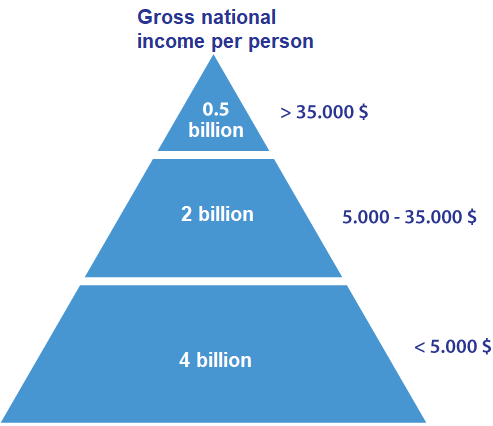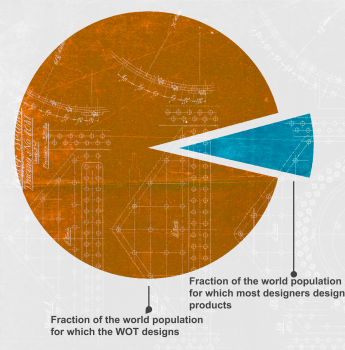What moves the WOT?

There are roughly 6.7 billion people worldwide, of which about 500 million live in relative luxury. 2 billion that make up the ‘Global middle class’ and 4 billion people that live in poverty. Those 4 billion people make up the base of the pyramid (see picture). They need a massive supply of vital and affordable products, such as water filters for 1 euro, glasses for a few euros or a house for a 10 euros.
The western world has, as of yet, given limited attention for this vast group of people. Most designers and engineers focus on the design and development of products for the wealthiest 10% of the population. Naturally, at this level there are plenty of challenges be it in the development of phones, flatscreens or modern medical technology – all very impressive.
But when observing this from a distance, does it not seem strange that so much time, energy and resources are invested in the development of luxury goods for a relatively small portion of the population, whereas so many essential products are needed for billions of people.

An argument might be – that’s where the money is at – but 4 billion is also a massive consumerbase, even if their individual equity is negligible.
Many enterprises, knowledge-institutes or developmental aid entities have already discovered this massive market. In increasingly numerous occasions these institutes join forces to bring and develop services for the base of the pyramid. Usually, the crux of these initiatives is to stimulate local entrepreneurship. Create jobs locally, improve self-worth, which is sadly usually an endless money drain without much success.
Enterprises discover the market at the base of the pyramid
Corporations such as Unilever and Philips are already heavily invested in this market. Unilever produces for example water filters for poor households in India and Philips makes lamps on solar-power for Africa. PepsiCo announced in 2010 that they want to provide clean water for 3 million people. Many enterprises dabble in these ventures often under Corporate Social Responsibility programs.
The role of universities
The development of products for the base of the pyramid is a daunting task, with many technological, social, financial and logistic variables. Per definition it is an interdisciplinary and international effort. At the University of Twente the minor ‘Crossing Borders’ is provided in these areas. Internationally there are the Development Technology Unit van de Univerity of Warwick, D-Lab van Massachusets Institute of Technology (MIT), Entrepeneurial Design for Extreme Affordability van Stanford University examples of this movement.
There are plenty possibilities for students and graduated designers or engineers to continue volunteering part of their time for the development of sustanable products for this market. Some do this by volunteering for nonprofits such as Architecture for Humanity, or Engineers Without Borders. Others choose to work full time on the development of sustainables for the world market.
The WOT
The WOT is a part of the broad international movement of designers and engineers that aim to develop creative technical solutions for problems in developing countries, where possible products that have the potential of turning a profit. At the WOT students spend part of their time developing products that are sustainable and extremely affordable. Which is a lot of fun and very inspiring. Are you interested? You can read more about it here or have a look at some of the other organisations.
